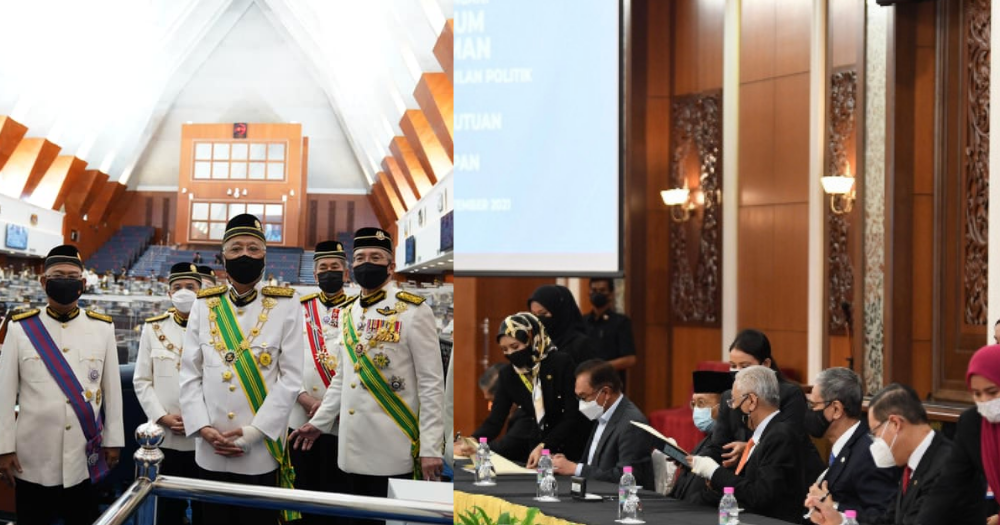Follow us on Telegram for the latest updates: https://t.me/mothershipsg
The Malaysian political landscape showed some form of development with the Memorandum of Understanding (MoU) inked between Prime Minister Ismail Sabri's administration and the opposing Pakatan Harapan (PH) leaders.
The MoU, titled "Political Transformation and Stability", was signed on the first day of the fourth session of Malaysia's 14th parliament on Sep. 13.
The signing of the deal has sparked speculations that Ismail Sabri is keen to retain the PH's support for his rule, and that it was a big win for him.
Speaking to Mothership, a political observer, however, said that Malaysians are the winners of this MoU out of all parties involved, even though it was signed among the political leaders.
Malaysians the real winners of the MoU
"The people can say that they are actually the winners in this whole saga," Senior Fellow from the Malaysian Studies Programme at the ISEAS-Yusof Ishak Institute Norshahril Saat said.
He opined that the promises and pledges by the political leaders, "if fulfilled", can be beneficial for the people.
Some of the measures listed in the MoU that might be beneficial to the people, Norshahril said, include implementation on lowering the age of voters, limiting the term of prime minister's tenure, and managing the Covid-19 situation.
The MoU consisted of several pointers for both the administration and the opposition to work on, namely empowerment of the Covid-19 plan, parliamentary reforms, and independence of judicial institutions, among others.
"I think these are very important developments if they are fulfilled," Norshahril shared, but he also said that "we must also think of other measures which have to be fulfilled, which is, of course, tackling the Covid-19 situation."
"That is the most important part in the people's minds," he added.
Stability in Malaysian politics, at least till next elections
Other than the management of Covid-19, one crucial question is whether the MoU gives some sense of political stability in Malaysia.
The Malaysian political scene was in limbo for around three years -- all within one election cycle -- following the Sheraton move, Mahathir's resignation, Muhyiddin stepping down, and Umno rising back to power.
With the MoU, Malaysians can expect some sort of relief from these political drama and "stability", Norshahril opined.
However, he cautioned that this stability is "contingent upon fulfilling the promises" laid out in the MoU.
Responding to Mothership's question on whether the MoU could possibly change the political landscape in Malaysia, Norshahril doubted that.
He said the agreement was "mainly for stability, at least up until the next election", which according to him, will be due in two years, in September 2023.
"Risky" to play politics
In addition, Norshahril said during this time, it will be "risky for both camps to play politics", referring to both "Perikatan Nasional 2.0" and PH.
He laid out three reasons why it is risky for leaders to do so.
King's "instrumental" role
First, he said that the Malaysian King has been playing an "instrumental" role in urging members of the house to stop politicking and "focus on tackling people's problems on the ground".
In his Royal Address during the opening of the parliament, the king had cautioned politicians from "gambling" with the future of the country for their own political agendas, The Star reported.
The Star added that the king had received "hundreds of letters" from the people expressing their sadness and discontentment over the current political situation.
People can be fed up with politicians
With that in mind, Norshahril opined that politicians must then ensure the "citizens do not suffer from political apathy".
According to him, "if there's too much politicking in the next couple of years, people may just get fed up with politicians".
And if that results in political apathy, "that's not good for the country," he added.
Short political runway
Furthermore, the time frame before the next election is held is simply too short for politicians to play games among themselves.
Norshahril said that two years before the next election is a "very short runway" for any parties to "capture power and deliver (their promises)".
"If (Ismail Sabri) don't deliver (he) may lose the next election in two or three years," he said.
Deliberative democracy is not only about reaching out to opposition
Besides signing the MoU, the Malaysian King had also requested politicians to practise "deliberative democracy".
This means that consultation and deliberation are central in the decision-making processes.
Norshahril believes that as Malaysia is battling the Covid-19 pandemic, "it's important for any government to actually listen to many parties, not only politicians but also professionals out there".
He expanded the idea of deliberation beyond the realm of politics.
"I think when we talk about deliberative democracy, it's not only about reaching out to the opposition, but also to reach out to critics of the government, outside the political sphere, and technocrats outside their political sphere," he said.
What is more important than a deliberative democracy, according to Norshahril, is a clean and efficient administration.
"Of course, deliberative democracy is important," he said, and added that the "administration itself has to be clean".
"The administration has to be efficient in tackling this pandemic situation," he said.
Related story:
Follow and listen to our podcast here
Top images via Ismail Sabri Yaakob/Facebook and @myedgeprop/Twitter
If you like what you read, follow us on Facebook, Instagram, Twitter and Telegram to get the latest updates.
